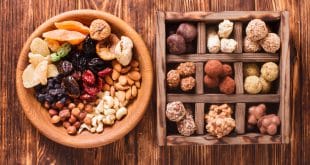
You’ve probably heard it all your life: eating candy will rot your teeth. But while a high sugar diet certainly promotes cavity formation (as well as other medical problems like obesity), sugar itself is not the real culprit behind tooth decay.
Caries – also known as caries, the Latin word for "expiration" – arise when bacteria live in the mouth digest carbohydrates debris on the Teeth left after eating. Such deposits include the refined sugars found in cookies, candy, and other goodies, but can also come from healthy foods like whole grains, vegetables, and fruits.
When these carbohydrates digest, bacteria in your mouth to produce An acid that combines with saliva to form the evil stuff your dentist warned you about: plaque. [Chewing: 8 foods for healthy teeth]
It is the plaque not sugar – that leads to tooth decay. Plaque begins to build up after every meal, and if it’s not brushed away frequently, it can erode the hard, external enamel of a tooth, causing tiny holes in the tooth surface. These holes mark the first stage of education.
And these tiny holes can do a lot of damage if left untreated. Finally, the acid and bacteria in the plaque can be eaten through the other layers of the teeth, as well as from the softer layer of the teeth under the enamel, called dentin, the third layer (pulp) that contains the blood vessels and nerves of your teeth. Cavities that affect the pulp of a tooth, as well as tooth support, bones can cause severe toothache, tenderness, pain when eating and abscesses in the mouth.
Ultimately, sugar is just one of the many carbohydrates that you can end up in the dentist’s chair for, but that doesn’t mean you should only trade in your apples for candy corn. In addition to many health benefits of a plant-based diet, the types of foods you eat are important to oral health.
Some foods – such as candy, peppermint candy, raisins and drying cereals – can be stuck in the grooves and crevices of the teeth where they could cause tooth decay. Fruit and yogurt, on the other hand, wash off easily with saliva and are therefore less likely to cause plaque formation.
And the way you consume food is as important as the type of food you eat. For example, a can of chug actually does less damage to your teeth than sipping a soda during the day because the acid created by mouth bacteria sticks around for 30 minutes after eating or drinking. So every time you munch another chip or take a sip of cola, you restart the clock plaque production and increase your risk of developing voids.
Carbonated soft drinks also contain phosphoric acid and citric acid fatty acids that have been proven to undermine tooth enamel. Eating or drinking highly acidic foods – including healthy foods such as citrus fruits – can not be properly cared for to prevent tooth decay.
Follow Elizabeth Palermo on @techEpalermo Twitter, Facebook or Google+. Follow LiveScience @livescience. We are also on Facebook & Google +.
RELATED ITEMS
-

Prevent and treat tooth decay properly, dak health
Optimal prevention and treatment of tooth decay The disease called tooth decay destroys the valuable tooth substance. But through healthy eating…
-

Chronic caries (including milk teeth in children)
There are two types of caries: acute and chronic caries. This separation of caries in formation and development is also considered…
-

Recipes for drinks without sugar
Recipe for energy balls without sugar Yes, there are drinks without sugar! And here we are not talking about bad water or bland…
-

A hole in the tooth – painless treatment
Why a hole in the tooth needs to be treated as quickly as possible and what treatment options are there? Unfortunately, a hole in the tooth is not uncommon…
